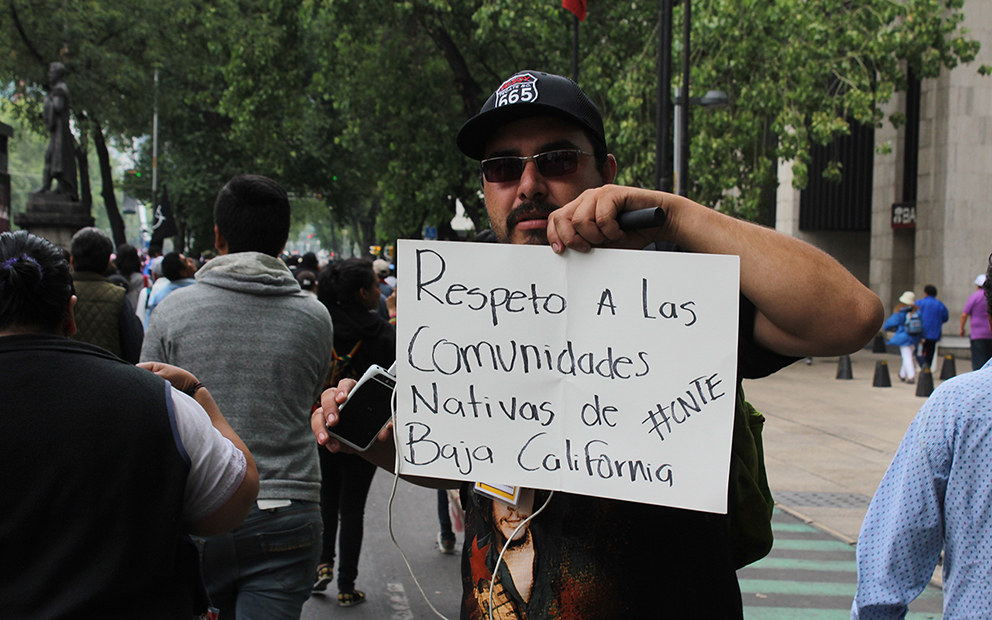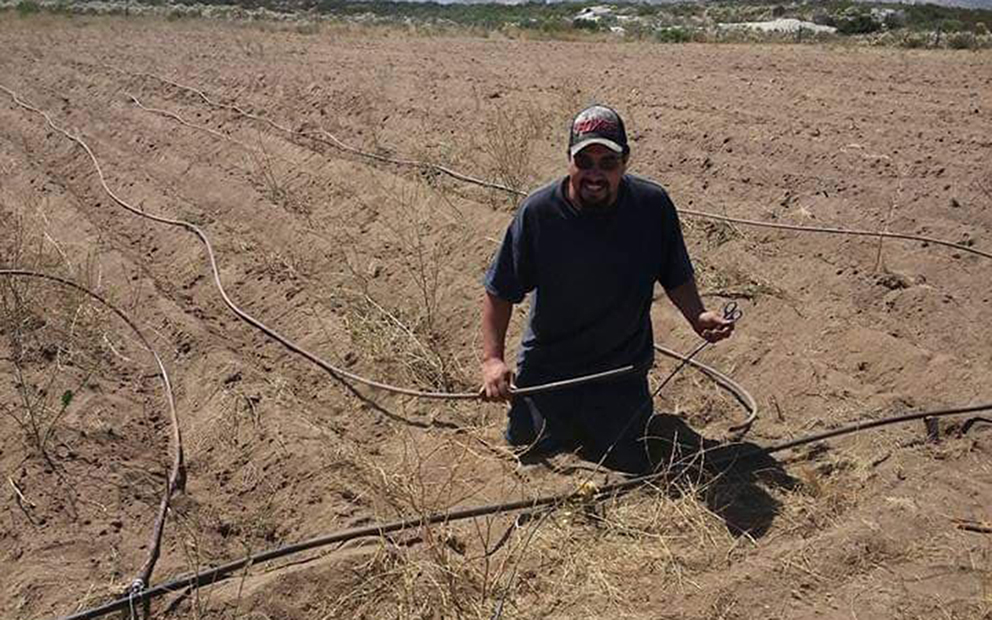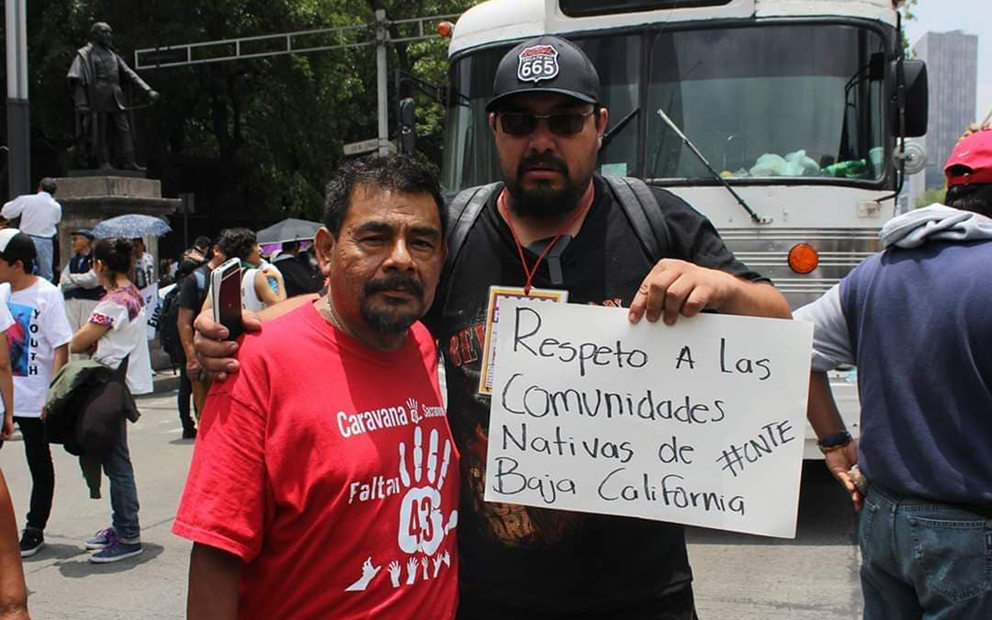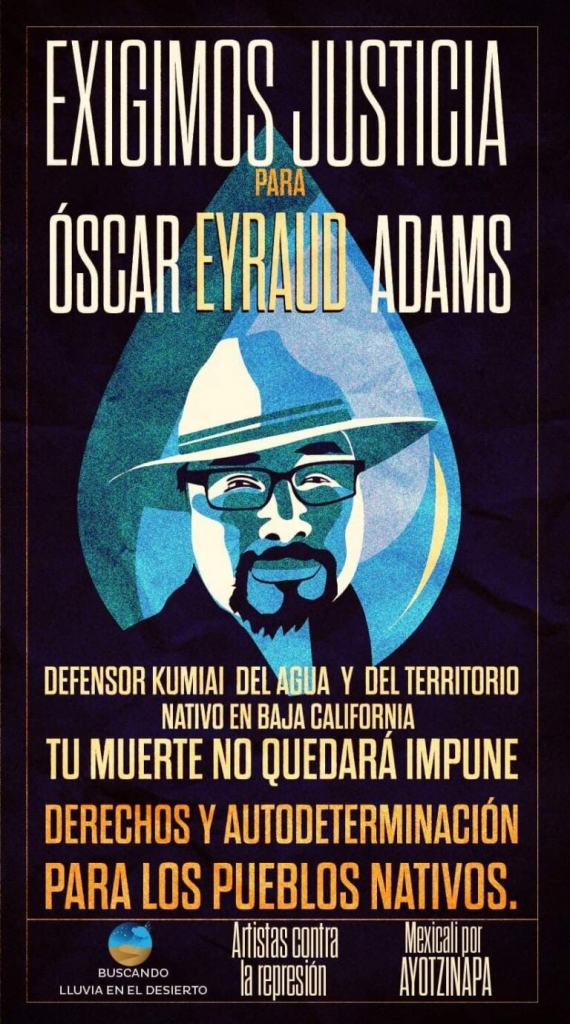
By Daliri Oropeza
September 26, 2020
Originally published in Pie de Página
Last Thursday, Óscar Eyraud Adams, a Kumiai land defender from Tecate, Baja California was assassinated. He denounced the dispossession of water by transnational companies, and the refusal of the National Water Commission (CONAGUA) to allow the Kumiai people to have a well. He was seeking self-determination for his people.
Óscar Eyraud Adams always wanted to learn. He defended the coveted lands of the Kumiai people in Tecate, Baja California. He was born in the Juntas de Neji community, in a place called Rancho los Baños. His friends always remember him worrying about the land he cultivated. He always expressed pride in his culture and traditions.
Over the last month, he publicly denounced corruption in the current concessions granted by CONAGUA in the region. He demonstrated how the Commission refused to allow the Kumiai inhabitants to dig a well that would allow them to irrigate the community’s crops. Óscar made these denunciations in every territory he set foot on. Without water, the Kumiai community of Tecate is in danger of disappearing.
In front of the cameras of a national newspaper, he showed the arid land where there used to be fruit trees:
“All of this disappeared due to lack of water; because we don’t have enough water. We do not have a permit to extract water with a well, and we would like Blanca Jimenez, the head of CONAGUA, to consider us before the large water consuming companies. Heineken has more than 12 wells, and the aquifer is overexploited.”
The Kumiai people don’t have water to plant. Óscar recently participated in an assembly and in organizational meetings for the self-determination of the Kumiai people; to defend the water against the constant assault of the corporations. He was always on the lookout to prevent wineries, foreigners or avaricious locals, (he called them “vivillos”), from taking land away from the community.
He was commissioned by his community, Kumiai Juntas de Nejí, to investigate rights to self-determination and autonomy. He investigated international treaties that would support his people, who are endangered due to lack of water. He also approached the agrarian lawyers of the National Indigenous Congress.
“He never held back his words” is how his friends remember him. He had been involved with the issue of water and its scarcity in the Kumiai territory for more than two years. He dedicated himself to denouncing the over-exploitation of the aquifers by transnational companies and the shortage of water suffered by his community, Kumiai Juntas de Nejí.
He denounced the lack of action by the local, state, and federal governments regarding the right to water. As well as the lack of interest by the authorities on the issues of the Indigenous Peoples of Baja California.
This is the context for the extraction of water by the LA Cetto winery in the Valle de Guadalupe. The company has seized land in the Kumiai region at its own discretion.
In recent days, he was formalizing a social complaint against the exploitation of water through various means.
“Oscar was always harshly criticizing the phony government, since it is well known by all that the government allows drug traffickers to work. And you know, there are many interests involved in the water issue, the beer companies’ political and transnational interests, to say nothing of the economic ones,” describes Mauro.

Tough, like his land
“He always showed his discontent with the government due to its abandonment of the Kumiai people, due to the situation of oblivion that is leading to their extinction,” says activist Mauro Cuevas Luna.
Óscar was always proud of being Kumiai. He knew the arid lands of Tecate very well, he used to walk them to contemplate the ancient settlements of his people. He constantly reminisced about his ancestors. He made many promises to take his friends to see “ little-known Kumiai rarities.”
“He used to get lost in the mountains,” says activist Adrián Zapata.
He remembers him as “tough, just like the Baja California climate.” He fought for his people by making them visible. Demanding that their rights and their existence be respected, even though the language is being lost.
“I remember him always worrying about the future of his community, denouncing the extermination of the Kumiai,” describes activist Diana Tlazohkamati.
The struggle for water also had to do with defending his own origin. Óscar was aware of his people’s relationship with water, which is why activist Adrián Zapata describes his struggle as “literally and metaphorically, a unique, pioneering, courageous struggle. Alone he faced the worst and most deadly war in the world: the war in defense of water.”
According to Diana, his struggle is important because it sought to put the water into the hands of those who actually know how to use it for the common good: the Kumiai people.
He denounced the “state’s tactics of dispossession against original peoples, designed to dissolve community practices that would boost the economy and the Kumiai socio-cultural fabric. The government was so interested in their dispossession that people from the community knew they could not safely enter a hospital, for example, because they feared they would not get out alive,” assures Diana.
He always had in mind the idea of a little school for a dignified education for his community, to rescue the knowledge of his ancestors.

From north to south, Oscar walked
Oscar actively participated in different social movements throughout the country during former president Peña Nieto’s administration. This gave him the opportunity to share with other communities that are opening paths to self-determination.
His friends remember him side by side with the Purépecha communities of Cherán, learning from the bonfires of the women who stand guard day and night. He learned how this town kicked organized crime out of its forests.
They tell stories of Óscar talking with all the families during the day laborer’s strike in San Quintín.
They talk of his participation in the mega marches with the teachers of the CNTE (the independent teachers union) against the Educational Reforms of Enrique Peña Nieto. Or in the collection and delivery of food to the Nochixtlán teachers’ demonstration, after the repression in Oaxaca. Photos of his unconditional support to the families of the 43 normalistas from Ayotzinapa circulate in social media.
He also participated in the national campaign denouncing forced disappearances, networking with organizations searching in the countryside. A few days ago, he organized brigades to search for missing youth, and to help with the case of a mother from Ayotzinapa who was in Mexicali.
They remember him on the frontlines in the campaign throughout the state for the support and liberation of Aurora Meza, defender of Kumiai territory. She was accused of stealing a horse because she refused to sell her land to a PRI politician.
The demand for indigenous rights was always present in his political activities. Activist Diana Tlazohkamati remembers him as “a person with a big heart,” participating with great commitment in national and local actions.
His friendship
Mauro Cuevas admired Óscar because “when he had to say something he never kept quiet. He was stubborn. A fucking Kumiai warrior, always concerned about his community and his friends. Sincere, intelligent, a man of action. A good friend, one of those you hang out with all day laughing; chitchatting; and who never let you down.”

Daliri Oropeza is an independent journalist based in Mexico. She may be reached as @Dal_air on Twitter and Flickr
Original published in Spanish in Pie de Página under the title, “Óscar Eyraud Adams: guerrero que defendió el agua del pueblo Kumiai.” English translation by Sexta Grietas del Norte.
